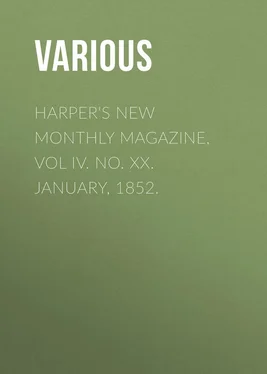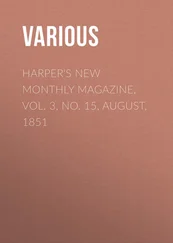Various - Harper's New Monthly Magazine, Vol IV. No. XX. January, 1852.
Здесь есть возможность читать онлайн «Various - Harper's New Monthly Magazine, Vol IV. No. XX. January, 1852.» — ознакомительный отрывок электронной книги совершенно бесплатно, а после прочтения отрывка купить полную версию. В некоторых случаях можно слушать аудио, скачать через торрент в формате fb2 и присутствует краткое содержание. Издательство: Иностранный паблик, Жанр: periodic, foreign_edu, на английском языке. Описание произведения, (предисловие) а так же отзывы посетителей доступны на портале библиотеки ЛибКат.
- Название:Harper's New Monthly Magazine, Vol IV. No. XX. January, 1852.
- Автор:
- Издательство:Иностранный паблик
- Жанр:
- Год:неизвестен
- ISBN:нет данных
- Рейтинг книги:3 / 5. Голосов: 1
-
Избранное:Добавить в избранное
- Отзывы:
-
Ваша оценка:
- 60
- 1
- 2
- 3
- 4
- 5
Harper's New Monthly Magazine, Vol IV. No. XX. January, 1852.: краткое содержание, описание и аннотация
Предлагаем к чтению аннотацию, описание, краткое содержание или предисловие (зависит от того, что написал сам автор книги «Harper's New Monthly Magazine, Vol IV. No. XX. January, 1852.»). Если вы не нашли необходимую информацию о книге — напишите в комментариях, мы постараемся отыскать её.
Harper's New Monthly Magazine, Vol IV. No. XX. January, 1852. — читать онлайн ознакомительный отрывок
Ниже представлен текст книги, разбитый по страницам. Система сохранения места последней прочитанной страницы, позволяет с удобством читать онлайн бесплатно книгу «Harper's New Monthly Magazine, Vol IV. No. XX. January, 1852.», без необходимости каждый раз заново искать на чём Вы остановились. Поставьте закладку, и сможете в любой момент перейти на страницу, на которой закончили чтение.
Интервал:
Закладка:
“A pardon? – a pardon!” exclaimed Olivarès. The soldiers shouted. The executioner began to unloose his victim, when a sign from Angeli made him pause. The governor read and re-read the missive.
“The body of Ranuccio Farnese!” he repeated: “the criminal’s name would suffice. Why these words, ‘ The body of ?’”
“What stops you?” cried the cardinal, at that perilous moment looking paler than his nephew.
“Read!” replied Angeli, handing him the pope’s letter.
“Is that all?” said his eminence, forcing a smile and pointing to the clock. “Look at the hour: it still wants two minutes of the time, and I received that paper from his holiness more than a quarter of an hour since.”
The governor bowed: the argument was irresistible. Ranuccio was given up to his deliverers. A carriage, with four fleet horses, waited outside the prison, and in a few moments the cardinal and the young prince were galloping along the road to Parma. Just then the clocks of Rome pealed forth in unison, as if rejoicing that by their judicious silence they had gained their master’s cause. It might be well if lawyers in our day would sometimes follow their example.
Monsignor Angeli, as the chronicle relates, was rather astonished at the rapid flight of time after his prisoner’s departure. In fact, the next hour seemed to him as short as its predecessor was long. This phenomenon, due to the simple system of compensation, was ascribed by him to the peaceful state of his conscience. Although inflexible in the discharge of what he esteemed his duty, he was in reality a kind-hearted man, and felt sincere pleasure at what he honestly believed to be Ranuccio’s pardon.
On the morrow the Spanish embassador was the first to congratulate Sixtus V., with admirable sang froid , on his truly pious clemency. Olivarès was only a diplomatist, but he played his part as well as if he had been a cardinal, and made every one believe that he had been the dupe of his accomplice. He had good reasons for so acting. His master, Philip II., seldom jested, more especially when the subject of the joke was the infallible head of the church; and he strongly suspected that the clocks of Madrid might prove less complaisant than those at Rome.
Poor Angeli was the only sufferer. For no other crime than that of not wearing a watch, the pope deprived him of his office, and imprisoned him for some time in Fort St. Angelo. As to Cardinal Farnese, renouncing all the praises and congratulations of his friends at Rome, he prudently remained an absentee.
MAURICE TIERNAY,
THE SOLDIER OF FORTUNE. 3 3 Continued from the December Number.
CHAPTER XLVIII
I sat up all night listening to the soldiers’ stories of war and campaigning. Some had served with Soult’s army in the Asturias; some made part of Davoust’s corps in the north of Europe; one had just returned from Friedland, and amused us with describing the celebrated conference at Tilsit, where he had been a sentinel on the river side, and presented arms to the two emperors as they passed. It will seem strange, but it is a fact, that this slight incident attracted toward him a greater share of his comrades’ admiration than was accorded to those who had seen half the battle-fields of modern war.
He described the dress, the air, the general bearing of the emperors; remarking that, although Alexander was taller and handsomer, and even more soldier-like than our own emperor, there was a something of calm dignity and conscious majesty in Napoleon that made him appear immeasurably the superior. Alexander wore the uniform of the Russian guards, one of the most splendid it is possible to conceive, the only thing simple about him was his sword, which was a plain sabre with a tarnished gilt scabbard, and a very dirty sword-knot; and yet every moment he used to look down at it and handle it with great apparent admiration; and “well might he,” added the soldier, “Napoleon had given it to him but the day before.”
To listen even to such meagre details as these was to light up again in my heart the fire that was only smouldering, and that no life of peasant labor or obscurity could ever extinguish. My companions quickly saw the interest I took in their narratives, and certainly did their utmost to feed the passion – now with some sketch of a Spanish marauding party, as full of adventure as a romance; now with a description of northern warfare, where artillery thundered on the ice, and men fought behind entrenchments of deep snow.
From the North Sea to the Adriatic, all Europe was now in arms. Great armies were marching in every direction; some along the deep valley of the Danube, others from the rich plains of Poland and Silesia; some were passing the Alps into Italy, and some again were pouring down for the Tyrol “Jochs,” to defend the rocky passes of their native land against the invader. Patriotism and glory, the spirit of chivalry and conquest, all were abroad, and his must indeed have been a cold heart which could find within it no response to the stirring sounds around. To the intense feeling of shame which I at first felt at my own life of obscure inactivity, there now succeeded a feverish desire to be somewhere and do something to dispel this worse than lethargy. I had not resolution to tell my comrades that I had served; I felt reluctant to speak of a career so abortive and unsuccessful; and yet I blushed at the half pitying expressions they bestowed upon my life of inglorious adventure.
“You risk life and limb here in these pine forests, and hazard existence for a bear or a chamois goat,” cried one, “and half the peril in real war would perhaps make you a Chef d’Escadron, or even a general.”
“Ay,” said another, “we serve in an army where crowns are military distinctions, and the epaulet is only the first step to a kingdom.”
“True,” broke in a third, “Napoleon has changed the whole world, and made soldiering the only trade worth following. Massena was a drummer-boy within my own memory, and see him now! Ney was not born to great wealth and honors. Junot never could learn his trade as a cobbler, and for want of better has become a general of division.”
“Yes, and,” said I, following out the theme, “under that wooden roof yonder, through that little diamond-paned window the vine is trained across, a greater than any of the last three first saw the light. It was there Kleber, the conqueror of Egypt was born.”
“Honor to the brave dead!” said the soldiers from their places around the fire, and carrying their hands to the salute. “We’ll fire a salvo to him to-morrow before we set out!” said the corporal. “And so Kleber was born there!” said he, resuming his place, and staring with admiring interest at the dark outline of the old house, as it stood out against the starry and cloudless sky.
It was somewhat of a delicate task for me to prevent my companions offering their tribute of respect, but which the old peasant would have received with little gratitude, seeing that he had never yet forgiven the country nor the service for the loss of his son. With some management I accomplished this duty, however, promising my services at the same time to be their guide through the Bregenzer Wald, and not to part with them till I had seen them safely into Bavaria.
Had it not been for my thorough acquaintance with the Tyroler dialect, and all the usages of Tyrol life, their march would have been one of great peril, for already the old hatred against their Bavarian oppressors was beginning to stir the land, and Austrian agents were traversing the mountain districts in every direction, to call forth that patriotic ardor which, ill-requited as it has been, has more than once come to the rescue of Austria.
Читать дальшеИнтервал:
Закладка:
Похожие книги на «Harper's New Monthly Magazine, Vol IV. No. XX. January, 1852.»
Представляем Вашему вниманию похожие книги на «Harper's New Monthly Magazine, Vol IV. No. XX. January, 1852.» списком для выбора. Мы отобрали схожую по названию и смыслу литературу в надежде предоставить читателям больше вариантов отыскать новые, интересные, ещё непрочитанные произведения.
Обсуждение, отзывы о книге «Harper's New Monthly Magazine, Vol IV. No. XX. January, 1852.» и просто собственные мнения читателей. Оставьте ваши комментарии, напишите, что Вы думаете о произведении, его смысле или главных героях. Укажите что конкретно понравилось, а что нет, и почему Вы так считаете.












